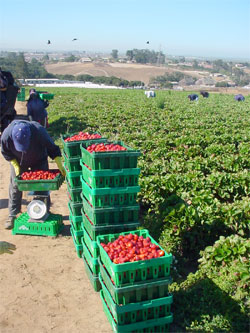Strawberry plants grown on commercial organic farms yield higher-quality fruit and have healthier soil than those grown conventionally, according to a study published on 1 September in the journal PLoS One. The research suggests that sustainable farming practices can produce nutritious fruit, if farmers manage soil and its beneficial microbes properly.
This is among the most comprehensive studies to investigate how conventional and organic farming methods affect both fruit and soil quality.
“Our study is unique because we used 26 commercial farms,” lead author and agroecologist John Reganold of Washington State University told mongabay.com. “It represents reality.” Previous studies comparing agricultural systems had used crops grown on research farm plots, he said.
 Workers collect organic strawberries grown in double rows on mounds in Watsonville, California, for the new crop study. Photo by: Greg Peck. |
Reganold and his colleagues matched adjacent conventional and organic fields in and around Watsonville, on California’s central coast, based on soil type and kinds of strawberries planted. In 2004 and 2005, they collected berries throughout the growing season for nutritional analyses.
Strawberries from the conventional and organic farms had similar levels of minerals such as potassium, phosphorous and calcium. However, organically grown berries had higher levels of antioxidants and polyphenols, nutrients linked to preventing cancer. They also had higher dry weight, or “more berry in the berry,” said Reganold.
Some of the best indicators of a farming method’s environmental impact lie in the dirt. Healthy soil contains a complex cocktail of nutrients and energy-providing microbes. Soil from the organic farms had higher levels of both markers than dirt from conventional farms.
Spraying fields with fumigants and pesticides may keep the bad microbes away, but it also can harm the helpful residents. Farmers treated the conventional fields with methyl bromide, an effective fumigant that also damages the ozone layer. One alternative, toxic methyl iodide, has been approved by 47 states. It is awaiting approval in California, although scientists and legislators are concerned about its health effects.
Modern crops yield nourishing fruit despite the onslaught of chemicals used in conventional agriculture. But when grown in rich organic soil, these plants often produce less fruit per harvest.
“Because of the way fertilizer is used and pests are controlled, there may be reasons to examine breeding crops for different conditions,” horticulturalist and study coauthor Preston Andrews of Washington State University told mongabay.com. Efforts to breed high-yielding crops for microbe-rich environments are still in the early stages, said Andrews.
The research impressed Frank Louws, a horticultural plant pathologist at North Carolina State University who was not involved with the study. He said the connection between the fruit quality and soil microbes was intriguing. Future sustainable farming methods need to cultivate the resident microbes, Louws said.
Organic farming is not the only environmentally friendly method. “There is a continuum of sustainability,” Louws told mongabay.com. “I work with conventional farmers who have a high land stewardship ethic, but [their farms] are not certified organic.” These farmers frequently rotate crops and carefully manage the amount of carbon in the soil, he said.
Melissae Fellet is a graduate student in the Science Communication Program at the University of California, Santa Cruz.
CITATION: John P. Reganold, Preston K. Andrews, Jennifer R. Reeve, Lynne Carpenter-Boggs, Christopher W. Schadt, J. Richard Alldredge, Carolyn F. Ross, Neal M. Davies, Jizhong Zhou. Fruit and Soil Quality of Organic and Conventional Strawberry Agroecosystems. PLoS One, published online September 1, 2010. doi: 10.1371/journal.pone.0012346
Related articles
Big Farms Can Make the Leap to Organic Farming, Study Suggests
(06/04/2008) Large fruit and vegetable growers can adopt the methods of small-scale organic farms while maintaining crop yields, keeping pests in check, and improving the health of their soil, researchers report in the July 2008 issue of Agriculture, Ecosystems and Environment.
Food miles are less important to environment than food choices, study concludes
(06/02/2008) Shoppers concerned about the environment should not place “buying local” at the top of their list of priorities when purchasing food, according to a study published online on April 16 in the journal Environmental Science & Technology. The fuel burned in transporting food items from farm to marketplace creates just a small percentage of the total greenhouse gas emissions associated with the food. Instead, consumers should shift their diets to include more foods that require less energy to produce in the first place.